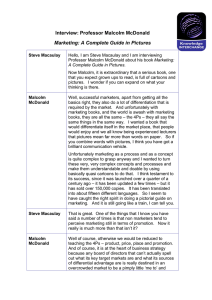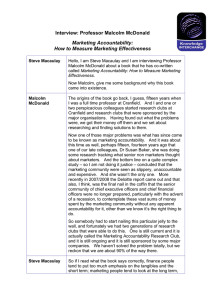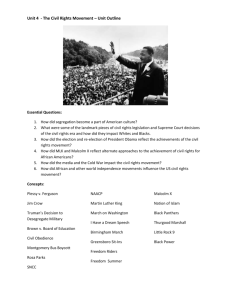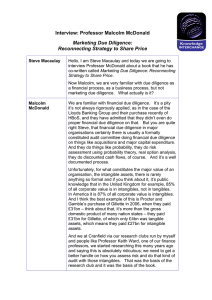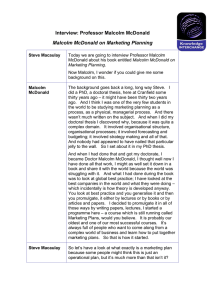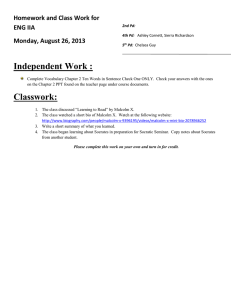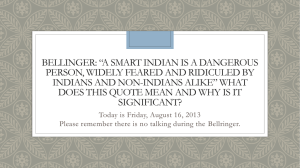Managers on the Move Professor Malcolm McDonald
advertisement
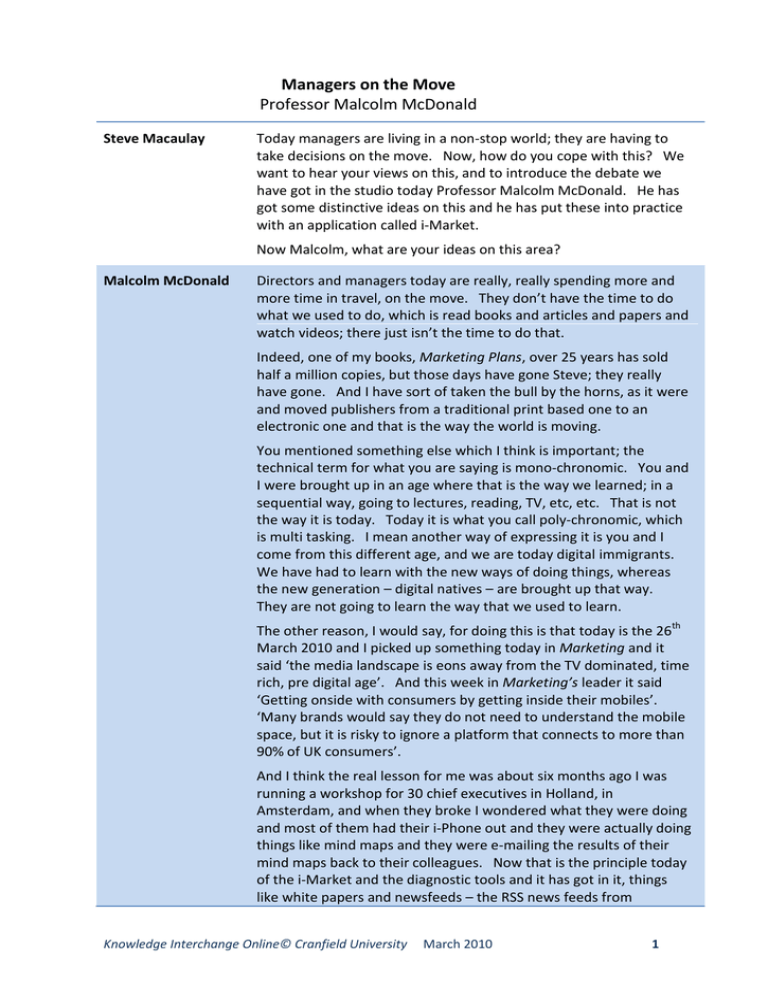
Managers on the Move Professor Malcolm McDonald Steve Macaulay Today managers are living in a non-stop world; they are having to take decisions on the move. Now, how do you cope with this? We want to hear your views on this, and to introduce the debate we have got in the studio today Professor Malcolm McDonald. He has got some distinctive ideas on this and he has put these into practice with an application called i-Market. Now Malcolm, what are your ideas on this area? Malcolm McDonald Directors and managers today are really, really spending more and more time in travel, on the move. They don’t have the time to do what we used to do, which is read books and articles and papers and watch videos; there just isn’t the time to do that. Indeed, one of my books, Marketing Plans, over 25 years has sold half a million copies, but those days have gone Steve; they really have gone. And I have sort of taken the bull by the horns, as it were and moved publishers from a traditional print based one to an electronic one and that is the way the world is moving. You mentioned something else which I think is important; the technical term for what you are saying is mono-chronomic. You and I were brought up in an age where that is the way we learned; in a sequential way, going to lectures, reading, TV, etc, etc. That is not the way it is today. Today it is what you call poly-chronomic, which is multi tasking. I mean another way of expressing it is you and I come from this different age, and we are today digital immigrants. We have had to learn with the new ways of doing things, whereas the new generation – digital natives – are brought up that way. They are not going to learn the way that we used to learn. The other reason, I would say, for doing this is that today is the 26th March 2010 and I picked up something today in Marketing and it said ‘the media landscape is eons away from the TV dominated, time rich, pre digital age’. And this week in Marketing’s leader it said ‘Getting onside with consumers by getting inside their mobiles’. ‘Many brands would say they do not need to understand the mobile space, but it is risky to ignore a platform that connects to more than 90% of UK consumers’. And I think the real lesson for me was about six months ago I was running a workshop for 30 chief executives in Holland, in Amsterdam, and when they broke I wondered what they were doing and most of them had their i-Phone out and they were actually doing things like mind maps and they were e-mailing the results of their mind maps back to their colleagues. Now that is the principle today of the i-Market and the diagnostic tools and it has got in it, things like white papers and newsfeeds – the RSS news feeds from Knowledge Interchange Online© Cranfield University March 2010 1 Professor Malcolm McDonald Management Today, FT.com, they can get in touch with me and we can instantly put whatever they need on to it. But the whole point is that it is management on the move for these time poor people. Steve Macaulay Aren’t you just adding to the problem? There are countless people like you bombarding people with saying here is the latest, try this, try that and so on. Isn’t there some kind of discerning capability that can be brought to this? Malcolm McDonald I think in principle what you say is right; but if you are a very experienced educator – and I like to think that all of us at Cranfield are very, very experienced educators, world leaders – we don’t do complicated things. What I have done is take complex managerial problems and turn them into very simple exercises that only take a few minutes. So I think that we have taken all of the complex learning that people are used to and made it accessible and more simple for them. And of course, they can do it quickly – this is the whole point. They can do it quickly and- much more importantthey can do it on the move, wherever they want and whenever they want. Steve Macaulay So give me some examples of the kind of, if you like, simple things that people need to be doing regularly but on the move. Malcolm McDonald Well one of the things that is on there is for example a business health check and it is the sort of thing that needs to be done regularly – not just once a year, certainly not once every two years. No less than once every three months. And this is a tried and tested questionnaire to which they give honest answers which will tell them if they are moving in the right direction. Another one is the age old problem of segmentation and what I have put on there is a very, very simple quick exercise in segmentation to move them away from the largely incorrect methods of segmentation that they have got to something that is needs based and implementable. But rather than having to read a book that has got 300 pages in it and go through a complex process, they can do this in about 20 minutes, maybe half an hour while they are on the plane, while they are on the beach, while they are on the train, whilst they are in the car – as long as they are not driving, that is. So I think it is the very opposite of what you are saying. It is making learning and doing simpler and accessible for these time poor directors and managers. Steve Macaulay Malcolm, that is a key message; thank you very much. Malcolm McDonald Pleasure. © Cranfield University February 2010 2
